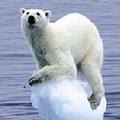 由美國內政部長坎培松(Dirk Kempthorne) 11日宣布的條例,已於16日刊載於美國聯邦政府公報(Federal Register)中,該條例可能導致許多國家計畫不受《瀕危物種法》的監督,其中包括產生溫室氣體的計畫。
由美國內政部長坎培松(Dirk Kempthorne) 11日宣布的條例,已於16日刊載於美國聯邦政府公報(Federal Register)中,該條例可能導致許多國家計畫不受《瀕危物種法》的監督,其中包括產生溫室氣體的計畫。
生物多樣性中心(Center of Biological Diversity)、綠色和平組織(Greenpeace)、野生生物保衛者(Defenders of Wildlife)等三個保育團體這正在法院挑戰這些條例,這些團體於12月11日,也就是該條例公布當日,向加州北區聯邦法院提起訴訟。
除非遭到法院的推翻,否則這些條例將會在美國總統當選人歐巴馬(Barack Obama)上任前9天,同時也是布希(George W. Bush)任期結束時,即明年1月11日生效。
生物多樣性中心主任格林沃(Noah Greenwald)表示:「這些條例會逐漸侵蝕國家的保護瀕危動物計畫,企圖在最後關頭削弱我們最重要野生生物保護法案,我們希望歐巴馬政府或新國會能盡速取消這項條例。」
訴訟內容認為該條例違反了《瀕危動物法》,且沒有經過公眾審查的過程。條例於8月11日首次提案,並由布希政府簡化流程後倉促地通過,僅以三個星期處理超過30萬件來自社會大眾的投書,以簡略的環評取代較正式的環境影響報告書。
依據現今法令規範,聯邦機關如批准、補助、或執行「可能影響」瀕危生物的計劃,或漁業暨野生物管理局已認定該計畫對瀕危物種有不利的影響,則聯邦機關必須向管理局(USFWS)進行協商。
但在新的條例下,聯邦政府機關能夠自行判定本身的行為是否對瀕危物種產生不利的影響,再決定是否須要向漁業暨野生生物管理局(USFWS)協商。
該項政策也可能妨礙國家保護北極熊等瀕危物種的計畫,使得溫室效應的影響在保護計畫中不受重視。
美國地質調查局(USGS)已發表了一系列的研究報告,內容預測北極熊重要的棲息地─夏季海冰,因受到氣候變遷影響而減少,結果可能在本世紀中導致世界上三分之二的北極熊死亡,包含所有在阿拉斯加的北極熊。
2008年5月14日北極熊在《瀕危動物法》中已被列為「瀕危」等級,保育團體提出的訴訟試圖讓北極熊與其他名列在保護法中生物一樣,能夠受到完整的保護。
北極熊是世界上體型最大的熊科物種,牠們分布在北極的19個亞族群中,其中名為楚克奇(Chukchi)與南波弗特海(Southern Beaufort Sea)的兩個族群位於美國境內。
野生生物保衛者組織的副主席克拉克(Jamie R. Clark)表示:「北極熊沒有時間等待政治鬥爭,牠們的棲地正逐漸融化,食物變得稀少缺乏,科學家也瞭解全球暖化正是造成的原因。儘管如此,政府現在公布的條例卻嚴酷地證實,將來幾乎不會有任何作為來拯救這些確認滅絕的生物。」
克拉克表示,把北極熊列為瀕危物種也許能協助保護牠們的棲地,避免受到石化業發展的威脅,而在阿拉斯加北方的楚克奇海(Chukchi Sea)發展石化正是布希政府亟欲推行的計畫,甚至已經在提供許多物種原始棲地的北極國家野生生物保護區內,提出開發計畫。
Regulations announced by Secretary of the Interior Dirk Kempthorne last week that would exempt many federal activities, including those that generate greenhouse gases, from review under the Endangered Species Act were published in the Federal Register Tuesday.
But the regulations are being challenged in court by three conservation groups - the Center for Biological Diversity, Greenpeace and Defenders of Wildlife, who filed suit in federal court for the Northern District of California the day the regulations were announced, December 11.
Unless overturned in court, the regulations will take effect on January 11, nine days before President-elect Barack Obama is inaugurated and the presidency of George W. Bush comes to a close.
"These regulations undermine fundamental protections for the nation's endangered species," said Noah Greenwald with the Center for Biological Diversity. "We hope an Obama administration or Congress will act quickly to undo this 11th hour attempt to weaken our most important law for protecting wildlife."
The lawsuit argues that the regulations violate the Endangered Species Act and did not go through the required public review process. The regulations, first proposed on August 11, were rushed by the Bush administration through an abbreviated process in which more than 300,000 comments from the public were reviewed in three weeks, and environmental impacts were analyzed in a brief environmental assessment, rather than a fuller environmental impact statement.
Under current regulations, federal agencies must consult with the U.S. Fish and Wildlife Service if the agencies permit, fund, or otherwise carry out actions that "may affect" endangered species, or if the Service has already determined those actions adversely affect endangered species.
Under the new regulations, federal agencies will themselves determine whether their actions are likely to adversely affect endangered species. That finding would determine whether the agency must consult with the Fish and Wildlife Service.
The policy would also prohibit any consideration of the impacts of greenhouse gas emissions from federal projects on endangered species such as the polar bear.
The U.S. Geological Survey has published a series of reports predicting that due to climate change loss of summer sea ice, crucial habitat for polar bears, could lead to the death of two-thirds of the world's polar bears by mid-century, including all of Alaska's polar bears.
The polar bear was listed as "threatened" under the Endangered Species Act on May 14, 2008. The conservation groups' lawsuit seeks to ensure that the polar bear receives the full protections that other species receive under the law.
The polar bear is the largest of the world's bear species and is distributed among 19 Arctic subpopulations - two of which, the Chukchi and the Southern Beaufort Sea populations, are located within the United States.
"The polar bear doesn't have time for political maneuvers. Its habitat is melting away, its food is becoming scarce and the science is clear that the cause is global warming - yet the rule this administration released today affirms that little will be done to save the species from sure extinction," said Clark.
Listing polar bears as threatened should help protect polar bear habitat from threats such as oil and gas development, which the Bush administration is aggressively pursuing in the Chukchi Sea north of Alaska and has even proposed in the pristine Arctic National Wildlife Refuge, which provides the primary land denning habitat for the species, she said.


